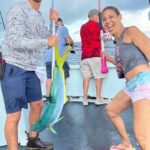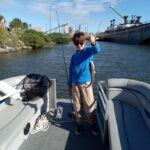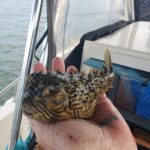Voters in Florida will have the chance to establish a Constitutional Right to Hunt and Fish in our state constitution on November 5, 2024.
This page helps people learn about the amendment and how it fits into our state’s conservation efforts by providing an overview of the movement’s specifics.
Conservation will be on the ballot in Florida this fall.

The Right to Fish and Hunt in Florida
ARTICLE I DECLARATION OF RIGHTS SECTION 28. Fishing, hunting, and the taking of fish and wildlife.—Fishing, hunting, and the taking of fish and wildlife, including by the use of traditional methods, shall be preserved forever as a public right and preferred means of responsibly managing and controlling fish and wildlife. This section does not limit the authority granted to the Fish and Wildlife Conservation Commission under Section 9 of Article IV.
What will the ballot say: CONSTITUTIONAL AMENDMENT ARTICLE I, SECTION 28 RIGHT TO FISH AND HUNT.—Proposing an amendment to the State Constitution to preserve forever fishing and hunting, including by the use of traditional methods, as a public right and preferred means of responsibly managing and controlling fish and wildlife. Specifies that the amendment does not limit the authority granted to the Fish and Wildlife Conservation Commission under Section 9 of Article IV of the State Constitution.
The Florida Guides Association, in collaboration with ALLFLA.ORG, is joining forces to raise awareness about the critical right to hunt and fish in Florida. With the issue slated for the November 2024 ballot, this partnership aims to educate citizens about the importance of preserving these traditions and ensuring access to recreational activities integral to Florida’s cultural and economic fabric. Together, they advocate for informed voting to safeguard these cherished outdoor pursuits for current and future generations.
Right now, 23 other states have a constitutional right to Fish and Hunt; Florida would be the 24th, and Iowa, Ohio, and Washington are all working towards this as well
Because fishing and hunting are two of the most important tools in the conservation toolbox. 19% of the current Florida Wildlife Corridor was acquired with Sportsmen’s dollars. Waterfowl and Geese numbers are up, while all other bird numbers are down; Audubon and Cornell University attribute this to hunters. Want clean water? Enshrine a right to fish, and you’ll ensure clean water, or give a good reason to challenge when that water is degraded. This is a conservation amendment.
We’re going to keep it brief, but the short answer is yes! Fishing and Hunting exist for one of 3 reasons: 1. Subsistence. While this is still important to a number of folks, the vast majority of people get their food from a grocery store 2. Conservation funding. The idea that license dollars advance conservation. This is a central premise to the North American Conservation Model. 3. A constitutional right. As we’ve seen changes to the first two over time, and we see the need to continue to work for more funding from more sources to provide for conservation, a Constitutional right becomes critically important.
This means “that which is legal at the time of passage” – it doesn’t undo decades of wildlife policy, or reverse the net ban, or any of the other fear-mongering type ideas that are mentioned – it really just protects that which is legal at the time of passage.
This is a great question! Anytime wildlife populations should be managed, be it to control population or human-interactions, hunting and angling should be considered first. This allows for a revenue generating, sustainable practice to conserve wildlife, vs. a myriad of ideas that afford a cost to the taxpayer while simultaneously blocking hunters and anglers from participating.
Absolutely not. Regulations, bag limits, seasons, determinations on if a species can be taken or not all still sits with FWC. This was an important part of the language in this amendment.
Absolutely not. In fact, in states with a Right to Fish and Hunt Amendment (North Carolina specifically), the amendment is being used to actively fight against and remove gill nets.
Because these protections already exist in Florida. Including a private property provision would’ve been redundant.
We’re conservationists, which means science should ultimately drive wildlife policy. Whether or not a species can be harvested should be up to experts, not emotion. This right simply ensures considerations are given when species are able to be managed with harvest.

Currently Involved States
Already have a Constitutional Right to Fish and Hunt
Supporting Wildlife Conservation
Fishing and hunting are the most important tools for managing wildlife populations…American hunters and anglers are the largest contributors to wildlife conservation in the country – Sportsmen and women contribute nearly $9.4 million every day, adding more than $3.4 billion every year for conservation.
Economic Impact
Florida is the fishing capital of the world. Saltwater and freshwater fishing generate $13.8 Billion in annual economic impact for Florida and support 120,000 jobs. Hunting provides another $2 billion annual economic impact and supports 14,300 jobs
The Wildlife Corridor
Sportsmen and women are responsible for over 19% of the Florida Wildlife Corridor
Everyone Loves It
Last year, the Florida Legislature decided to allow this amendment to be placed on the November 2024 ballot – with a hugely bipartisan 159-1 vote. Sponsors lined up from both parties to support this amendment
Growth and Development
Many states, especially ones with changing demographics and suburban sprawl, are experiencing both overt and covert threats to their sporting heritage. A R2FH becomes another tool in protecting both these pastimes and habitat
Take the Pledge




